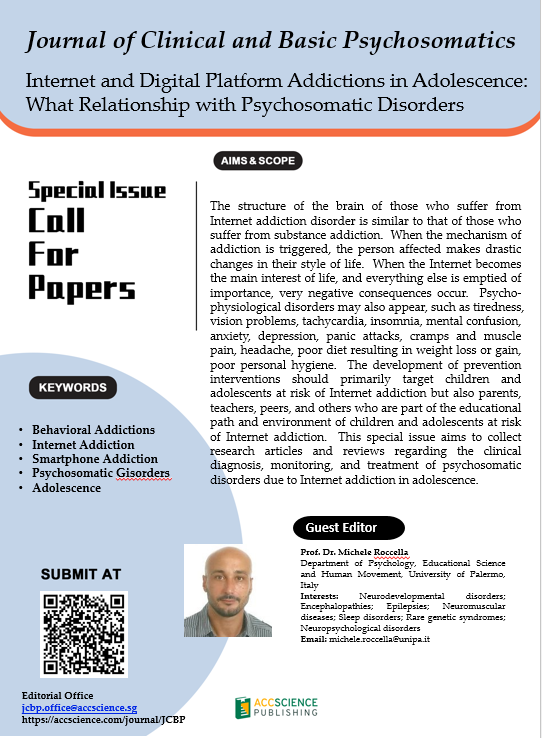Internet and Digital Platform Addictions in Adolescence: What Relationship with Psychosomatic Disorders

Department of Psychology, Educational Science and Human Movement, University of Palermo, ItalyNeurology and child and adolescent psychiatry; Neurodevelopmental disorders; Encephalopathies; Epilepsies; Neuromuscular diseases; Sleep disorders; Rare denetic syndromes; Neuropsychological disorders

Dear Colleagues,
In recent years, the scientific community has dedicated many studies to the phenomena of behavioral addictions. Over the last decade, the observation of Internet addiction has increased significantly of the phenomena connected to the use of digital platforms. Among the addictions linked to the use of the Internet there are Gaming Disorder, addiction to virtual relationships, addiction to excessive information, social networks, and cybersex. Another construct of recent interest is social withdrawal and its links with Internet addictions. The structure of the brain of those who suffer from Internet addiction disorder is similar to that of those who suffer from substance addiction. When the mechanism of addiction is triggered, the person affected makes drastic changes in their style of life. When the Internet becomes the main interest of life, and everything else is emptied of importance, very negative consequences occur, such as, for example: avoidance of important real-life activities to have more time online; sleep deprivation, or changing sleep habits to spend more time online; decreased socialization; I refuse to spend a lot of time away from the Internet; strong desire to spend more time on the computer/cell phone; inability to control one's use of the network; restlessness and irritability while trying to reduce internet use; abandonment of other forms of entertainment (TV, reading, gaming...); denial of the problem; tendency to neglect study/work. Psycho-physiological disorders may also appear, such as tiredness, vision problems, tachycardia, insomnia, mental confusion, anxiety, depression, panic attacks, cramps and muscle pain (neck pain), headache, poor diet (not eating or eating excessively so as not to leave the computer) resulting in weight loss or gain, poor personal hygiene (e.g., not taking a bath to stay online). The development of prevention interventions should primarily target children and adolescents at risk of Internet addiction but also parents, teachers, peers, and others who are part of the educational path and environment of children and adolescents at risk of Internet addiction. This special issue aims to collect research articles and reviews regarding the clinical diagnosis, monitoring, and treatment of psychosomatic disorders due to Internet addiction in adolescence.

